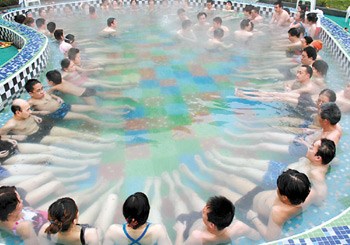
Most geothermal resources are used by low value-added industries such as spas, heating and cultivation in China.
(Ecns.cn) -- China has launched a series of geothermal energy exploration and development projects in recent years, aiming to tap another renewable clean energy resource. However, the blind pursuit of that resource has led to many troubling problems, reports the Economic Information Daily.
In big cities, the number of hot springs and spas has rapidly increased, with real estate developers boasting projects based on easy access to ground source heat.
But a lack of scientific urban planning has already caused degradation of resources; temperatures of geothermal water sources are gradually declining, and proven reserves are being exploited much deeper than ever before.
Experts say the situation will continue to deteriorate if immediate measures are not taken, and even cities with rich geothermal resources could be significantly affected.
Environment friendly
Last year, the government introduced the development of new energy sources like solar and bioenergy in its 12th Five-Year Plan (2011-2015). Geothermal power was also prioritized.
The Ministry of Land and Resources said the country would increase the proportion of geothermal-generated power in its energy mix to 1.7 percent, more than 10 times the amount then used.
Data show that the amount of heat contained in China's shallow, geothermal energy sources is equivalent to 350 million tons of standard coal burned annually, based on the present development model.
By rough calculation, if the heat is properly exploited, geothermal energy could keep about 200 million tons of standard coal in the ground every year.
In Beijing, which has abundant geothermal resources, more than 400 deep wells provide heat for buildings. In Shenzhen, after the government prohibited the use of coal-burning boilers in residential communities, the development of geothermal energy experienced a period of rapid growth.
By doing so, carbon emissions in both cities have been reduced, and some residential communities now boast of being environmentally friendly, according to the Economic Information Daily.
Artificial hot springs
The emergence of geothermally-heated groundwater from the Earth's crust sometimes creates natural hot springs. Humans often use such locations for purposes of pleasure.
Beijing has historically been home to three famous natural hot springs – one in Wenquan Town of Haidian District, one in Xiaotangshan Town of Changping District and the other in Songshan Park of Yanqing District. Now, only the last one remains (the other two dried up).
Part of the reason the two springs disappeared was the exploitation of geothermal resources by humans, says the Economic Information Daily.
To build an artificial hot spring, one has to dig more than 1,000 meters below ground, which will eventually cause underground hot water levels to drop.
In 2010, local businessmen in Zunhua County of Hebei Province tapped a thousand-year-old hot spring to extract hot water for their spa resorts. Later, as the resorts became more popular and their wells began drying up, the men were forced to boil water for their artificial springs.
The problem has been worsened by the state policy to promote geothermal energy because resources have been consumed in an unscientific way, depleting underground hot water levels dramatically in cities such as Beijing and Shenzhen.
Beijing's geothermal water level is dropping at the speed of two meters each year, posing threats to enterprises that rely on the resources, said Zhou Xun, professor at the School of Water Resources and Environment at China University of Geosciences.
Protection needed
Most geothermal resources are used by low value-added industries such as spas, heating and cultivation, which was not the original intention of the state-level policy, says the Economic Information Daily.
Using geothermal energy produces fewer emissions, but if the heat is not property dealt with, geothermal resources will be exhausted and environmental hazards such as thermal pollution and chemical contamination will become a problem, the magazine adds.
In developed countries, geothermal resources can only be used with the permission of the government. Moreover, used underground water and steam should be channeled back into the ground once it has cooled down, so that water levels will not be affected as much.
In China, there are similar regulations, but they do not function as expected. Most people think geothermal resources are abundant and inexhaustible, so the government must strengthen the enforcement of related laws and regulations to better protect the country's geothermal resources.

Copyright ©1999-2011 Chinanews.com. All rights reserved.
Reproduction in whole or in part without permission is prohibited.